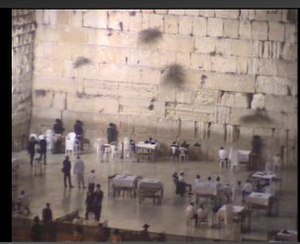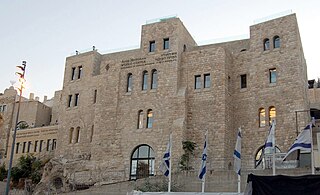
A Western Wall camera, also known as a wallcam, is a live webcam that displays action at the Western Wall live as it is taking place.
Contents
Some cameras operate all the time. Others refrain from operating during Shabbat and Jewish holy days.

A Western Wall camera, also known as a wallcam, is a live webcam that displays action at the Western Wall live as it is taking place.
Some cameras operate all the time. Others refrain from operating during Shabbat and Jewish holy days.
There are several operators of Western Wall cameras. [1] Some of the operators also provide a service of allowing people to remotely place notes in the wall by entering their prayers on a site, which are then printed and placed in the wall by a volunteer in Jerusalem. [2]
The Western Wall Heritage Foundation is one of the operators. By providing this service, they enable people to view the wall without the expense of traveling there. [3]
Virtual Jerusalem began providing the service 5 December 1996 (the first night of Hanukkah) by installing a camera on a yeshiva opposite the Western Wall Plaza. The camera started filming all action live except on Shabbat and Jewish festivals. [4]
Aish HaTorah provides this service on their site. [5]

The Temple in Jerusalem, or alternatively the Holy Temple, refers to the two religious structures that served as the central places of worship for Israelites and Jews on the modern-day Temple Mount in the Old City of Jerusalem. According to the Hebrew Bible, the First Temple was built in the 10th century BCE, during the reign of Solomon over the United Kingdom of Israel. It stood until c. 587 BCE, when it was destroyed during the Babylonian siege of Jerusalem. Almost a century later, the First Temple was replaced by the Second Temple, which was built after the Neo-Babylonian Empire was conquered by the Achaemenid Persian Empire. While the Second Temple stood for a longer period of time than the First Temple, it was likewise destroyed during the Roman siege of Jerusalem in 70 CE.

The Western Wall, known in the West as the Wailing Wall, and in Islam as the Buraq Wall, is a portion of ancient limestone wall in the Old City of Jerusalem that forms part of the larger retaining wall of the hill known to Jews and Christians as the Temple Mount. Just over half the wall's total height, including its 17 courses located below street level, dates from the end of the Second Temple period, and is believed to have been begun by Herod the Great. The very large stone blocks of the lower courses are Herodian, the courses of medium-sized stones above them were added during the Umayyad period, while the small stones of the uppermost courses are of more recent date, especially from the Ottoman period.

A webcam is a video camera which is designed to record or stream to a computer or computer network. They are primarily used in video telephony, live streaming and social media, and security. Webcams can be built-in computer hardware or peripheral devices, and are commonly connected to a device using USB or wireless protocols.

Shavuot, or Shvues in some Ashkenazi usage, commonly known in English as the Feast of Weeks, is one of the biblically-ordained Three Pilgrimage Festivals. It occurs on the sixth day of the Hebrew month of Sivan; in the 21st century, it may fall between May 15 and June 14 on the Gregorian calendar.

The Seventeenth of Tammuz is a Jewish fast day commemorating the breach of the walls of Jerusalem before the destruction of the Second Temple. It falls on the 17th day of the 4th Hebrew month of Tammuz and marks the beginning of the three-week mourning period leading up to Tisha B'Av.

Aish HaTorah is an Orthodox Jewish educational organization and yeshiva.

Cholent or Schalet is a traditional slow-simmering Sabbath stew in Jewish cuisine that was developed by Ashkenazi Jews first in France and later Germany, and is first mentioned in the 12th century. It is related to and is thought to have been derived from hamin, a similar Sabbath stew that emerged in Spain among Sephardic Jews and made its way to France by way of Provence.
Shraga Simmons is an Orthodox Jewish rabbi, journalist, filmmaker, brand builder and leader in Torah-themed marketing. He is the co-founder of Aish.com, the educational website and co-founder of HonestReporting, the pro-Israel media watch group. He is also founder and director of the online Torah academy JewishPathways.com.
Kalman Packouz was an Orthodox rabbi who pioneered various Jewish educational initiatives geared towards baalei teshuva outreach.
Pikuach nefesh, which means "saving a soul" or "saving a life," is the principle in Halakha that the preservation of human life overrides virtually any other religious rule of Judaism. In the event that a person is in critical danger, most mitzvot, including the Ten Commandments of the Torah, become inapplicable if they would hinder the ability to save oneself or someone else. However, there are certain exceptions; some rules and commandments may not be broken under any circumstances and thus may require an act of self-sacrifice.
A Shabbos goy, Shabbat goy or Shabbes goy is a non-Jew who is employed by Jews to perform certain types of work (melakha) that Jewish religious law (halakha) prohibits a Jew from doing on the Shabbat.

Shabbat is the first tractate of Seder Moed of the Mishnah and of the Talmud. The tractate deals with the laws and practices regarding observing the Jewish Sabbath. The tractate focuses primarily on the categories and types of activities prohibited on the Sabbath according to interpretations of many verses in the Torah, notably Exodus 20:9–10 and Deut. 5:13–14.
Orthodox Jewish outreach, often referred to as Kiruv or Qiruv, is the collective work or movement of Orthodox Judaism that reaches out to non-observant Jews to encourage belief in God and life according to Jewish law. The process of a Jew becoming more observant of Orthodox Judaism is called teshuva making the "returnee" a baal teshuva. Orthodox Jewish outreach has worked to enhance the rise of the baal teshuva movement.
The Heritage House is a non-profit youth hostel in the Jewish Quarter of the Old City of Jerusalem. It offers free or subsidized lodging to Jews from around the world. The hostel provides young Jewish adults with information on touring, studying, intern, and work opportunities in Israel, in addition to providing follow-up connections, especially with the Jewish communities back in their home towns around the world.

Placing notes in the Western Wall refers to the practice of placing slips of paper containing written prayers to God into the cracks of the Western Wall, a Jewish holy site in the Old City of Jerusalem.
Lori Palatnik is the founding director of Momentum. Formerly called The JWRP, Momentum works to strengthen Jewish identity and connection to Israel through young mothers in their communities. She is an educator, public speaker, and community activist.

Wilson's Arch is the modern name for an ancient stone arch in Jerusalem, the first in a row of arches that supported a large bridge connecting the Herodian Temple Mount with the Upper City on the opposite Western Hill. The Arch springs from the Western Wall and is still visible underneath later buildings set against the Wall. The name Wilson's Arch is also used to denote the hall that it partially covers, which is currently used as a synagogue. This hall opens towards the Western Wall Plaza at the Plaza's northeast corner, so that it appears on the left of the prayer section of the Western Wall to visitors facing the Wall.

Naftali Schiff is the Founder and Chief Executive of Jewish Futures, also known as Jewish Futures Trust, a not-for-profit international organisation, which creates, incubates and scales dynamic educational organisations and initiatives, propelling each forward to ensure vibrant Jewish futures.
Jeffrey "Jeff" Seidel is a kiruv personality in Jerusalem. Since 1982, he has introduced thousands of Jewish college students to their first Shabbat experience and offered free tours and classes through his Jewish Student Information Centers in Jerusalem, Tel Aviv, Beersheba, and Herzliya. He also compiled The Jewish Traveler's Resource Guide, which lists Shabbat placement programs around the world.

Am Yisrael Foundation is a Tel Aviv and New York–based foundation and umbrella nonprofit organization for a variety of initiatives that promote Zionist engagement among Jewish young adults residing in Israel, including providing leadership platforms for young Jews who have made Aliyah, or are contemplating immigration to Israel.